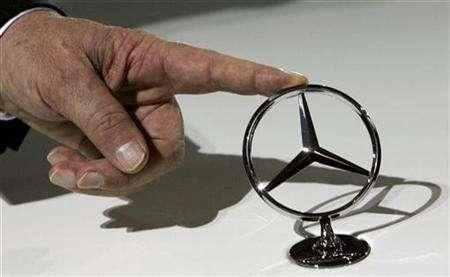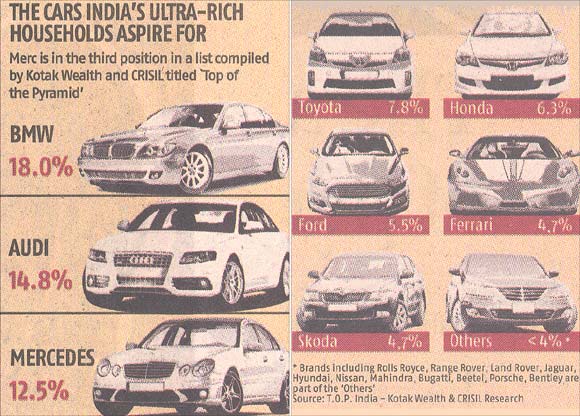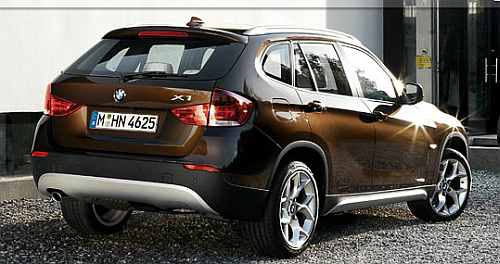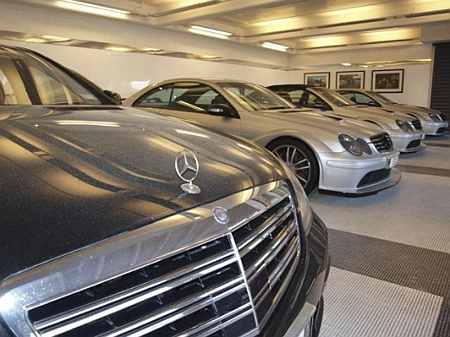 | « Back to article | Print this article |
How Mercedes plans to regain lost ground in India
It had lost the top position to BMW in the luxury car segment three years ago. But 2012 has brought in even worse news: Mercedes, the Stuttgart-headquartered world's oldest car maker, has slipped to the third position after Audi, owned by Volkswagen.
While the gap between the two till April this year was marginal, it widened substantially in May, strengthening Audi's position in the second slot.
At a time when the luxury car market in India has grown at the slowest pace in two years (sales grew only 10 per cent in five months ended May 2012), Mercedes sales dropped over 20 per cent, but Audi and BMW grew 37 per cent and 10 per cent, respectively.
Click NEXT to read more...
How Mercedes plans to regain lost ground in India
Going forward, Merc's disconnect with the Indian market is evident from the fact that it ranks third in the list of the most aspired cars in India in a study of India's ultra rich households that was released on Tuesday (see graph).
The study titled Top of the Pyramid by Kotak Wealth Management and Crisil said 12.5 per cent of the ultra high networth individuals want Mercedes compared with 18 per cent for BMW and 14.8 per cent for Audi.
So has Mercedes lost the plot in India? That may be an exaggeration, but the fact is both BMW and Audi have cashed in on the perception that Mercedes is only an old man's car.
Click NEXT to read more...
How Mercedes plans to regain lost ground in India
Research reports have stated that Mercedes is more popular among senior executives in the 46-60 age bracket, while the younger buyers have opted for the BMWs and the Audis.
But Mercedes seems to have finally woken up to the problem. That explains the company's plan to launch the B-Class Sports Tourer, which will hold the title of the company's first entry-level model in the Indian market to compete with Audi Q3 and the BMW X1, in terms of price.
The B-class, which will be similar to that of an oversized hatchback, will be priced below Mercedes' current entry level C-Class, which retails at upwards of Rs 28.3 lakh.
Click NEXT to read more...
How Mercedes plans to regain lost ground in India
This will be followed by the A Class next year, which would be the smallest in the Mercedes brand range worldwide. The A Class, however, will be one of the most expensive compact cars in India -- next only to the Fiat 500 and the Volkswagen Beetle.
Experts say going down the price ladder is a move that Mercedes should have taken long ago. For proof, consider the success of Audi Q3, which is an entry-level crossover.
The car got 500 bookings within just five days of its launch, prompting Audi to open the next round of bookings. So gung-ho is Audi that it is already talking in terms of the No 1 slot in India.
Click NEXT to read more...
How Mercedes plans to regain lost ground in India
BMW, in fact, had extended its lead over Mercedes only after it launched a compact SUV, X1, which is also one of the two cheapest models offered by the company.
As per BMW data, the five-seater urban SUV X1, priced at Rs 24.5 lakh (ex-showroom), is the third largest selling model in its line-up, accounting for more than a fourth of its total sales in the country after the 5-series and the 3-series.
Mercedes, however, doesn't want to read too much into the pricing and market share game and accuses its competitors of offering huge discounts to shore up volumes and gain market share.
Click NEXT to read more...
How Mercedes plans to regain lost ground in India
Debashis Mitra, director, sales and marketing, Mercedes-Benz India, says, "Price is not a strategy, it's a tool. You play it too hard and that becomes a benchmark to get one level lower. A luxury SUV from one of the companies is sold at a discount of Rs 4 lakh. This SUV constitutes more than a fifth of its sales".
Competitors, predictably, dismiss such claims.
The market for luxury cars in India now is 22,000-23,000 per annum, growing more than 20 per cent annually barring the last year.
Click NEXT to read more...
How Mercedes plans to regain lost ground in India
But this is just one per cent of the total Indian car market, way less than the ratio in its home country, Germany, at 15 per cent and China at 4 per cent. But the potential for growth is something that gives Mercedes hope.
"When the Indian car market doubles in the next five to six years to five million units and even if the share of luxury cars stays the same, we are expecting doubling of volumes from here", says Mitra.
Apart from newer and cheaper models, Mercedes is also exploring markets beyond the four metros to the towns that would be the "growth engines of the future".
How Mercedes plans to regain lost ground in India
That explains its frequent roadshows in places such as Nellore, Jabalpur, Raipur and Karnal to gauge customer response.
If it finds the demand robust, the company sets up full-fledged dealerships. Several of its new sales outlets have come up in Tier II areas following greater demand.
But it's a game being played by BMW and Audi, too. Michael Perschke, Head, Audi India, says, "Our focus now is on Tier-II & Tier-III cities, which are showing a healthy appetite for luxury cars. In the past few months, we have opened new showrooms in Bhopal, Ludhiana, Surat, Indore, Nagpur and Coimbatore and will add several more in the months to come".
The great Indian luxury car race is, thus, going to be tougher for players like Mercedes.








